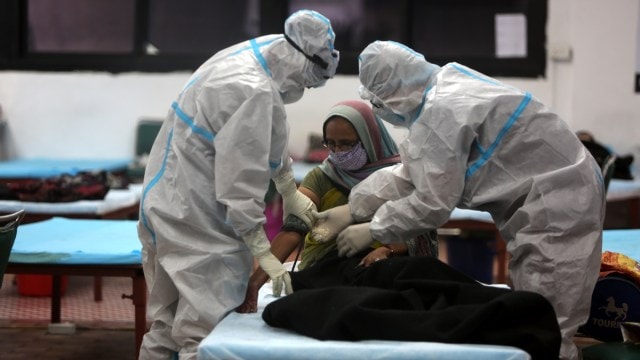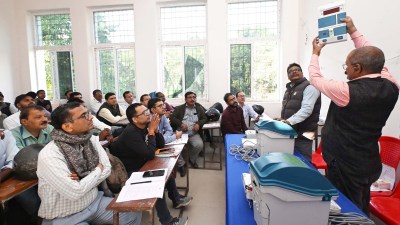Positive Covid cases are slipping through the cracks. And, a higher positivity rate during RT-PCR tests compared to rapid antigen testing (RAT), which has a high degree of false negatives, is an “alarm bell”.

Follow Covid-19 Live Updates here
Among the key recommendations made by the Centre are: Trace 15 close contacts of at least 80 per cent of positive cases, and test and isolate them within 72 hours; increase the proportion of RT-PCR tests, specifically in super-spreader sites; conduct an intensive awareness drive on the lines of the dengue campaign.
Story continues below this ad
On Thursday, Delhi recorded 6,715 cases. “If we look at today’s situation, it is worrying. Delhi’s fatality rate of 1.71 per cent is higher than the national fatality rate of 1.49 per cent. The recovery rate is also a little lower than the national recovery rate. There are six districts where the positivity rate is between 12-14 per cent. This should be ideally at around 5 per cent,” Harsh Vardhan said during the video-conference.
The meeting was attended by Delhi’s Lieutenant Governor Anil Baijal, Health Minister Satyendar Jain, and all district magistrates and municipal commissioners, apart from Union Health Secretary Rajesh Bhushan.
“If we look at the first week of July, when the Union Home Ministry stepped in, Delhi was reporting around 3,000 cases and 60 deaths per day. In mid-August, Delhi, on an average, was registering around 1,000 cases and 12 deaths per day. From mid-August to the first week of November, the average daily numbers had reached 5,000 cases and 42 deaths. Therefore, we said, despite the enhanced rate of testing, you are still missing the positive cases,” sources in the central government said.
Delhi| Private hospitals move SC over plan to reserve beds
Story continues below this ad
“The first thing to do is that at least in 80 per cent of all new positive cases, the close contacts must be tested within the first 72 hours. The administration says they are now tracing almost 15 contacts per positive person. We said that it is important, but equally important is that these 15 contacts must be traced in the first 72 hours to prevent spread,” the sources said.
The Centre underlined that after tracing and testing, isolation should be done within three days. “All these three things must happen simultaneously,” sources said.
Officials pointed out that while RAT is reporting just 7 per cent positivity in some districts of Delhi, RT-PCR testing shows as much as 20 per cent.
“RAT is an important test and has a specific role, which is to screen cases in densely populated areas and hotspots. But if you see the vast difference in positivity rates, which is the case in some Delhi districts, this is an alarm bell. It means you need to proportionally increase your RT-PCR tests,” sources said.
Story continues below this ad
Besides, the Centre told Delhi to increase RT-PCR testing in potential super spreader sites. “You must conduct testing in markets like Lajpat Nagar, Sarojini Nagar and Karol Bagh. The testing must be done in temples, mosques, gurdwaras, churches — places where people congregate — and barber shops, beauty parlours and restaurants. We have recommended targeting testing,” sources said.
“The third point, we told them, is to look at their own Dengue awareness campaign, which has achieved good results with an effective communication strategy. The same needs to be done for Covid,” sources said.
In a press release later, the Centre said: “The Union Minister was… informed… that Delhi continues to have a highly skewed RAT to RT-PCR ratio — 77% of the tests are RAT-based while RT-PCR comprises only 23% of the total tests. Noting that false negative results might give way to complacency among the Covid infected, he pressed for mandatory testing of all RAT-negative persons if they develop ILI/SARI symptoms afterwards.”
In response, the Delhi government said: “Delhi’s ratio of RAT to RT-PCR tests stands at 77% primarily because Delhi has adopted an aggressive testing strategy and is testing more than any city or state in India, and in fact, among the highest in the world. We stand committed to increasing our capacity to conduct more RT-PCR tests and urge the Centre to provide all possible resources towards that end.”









